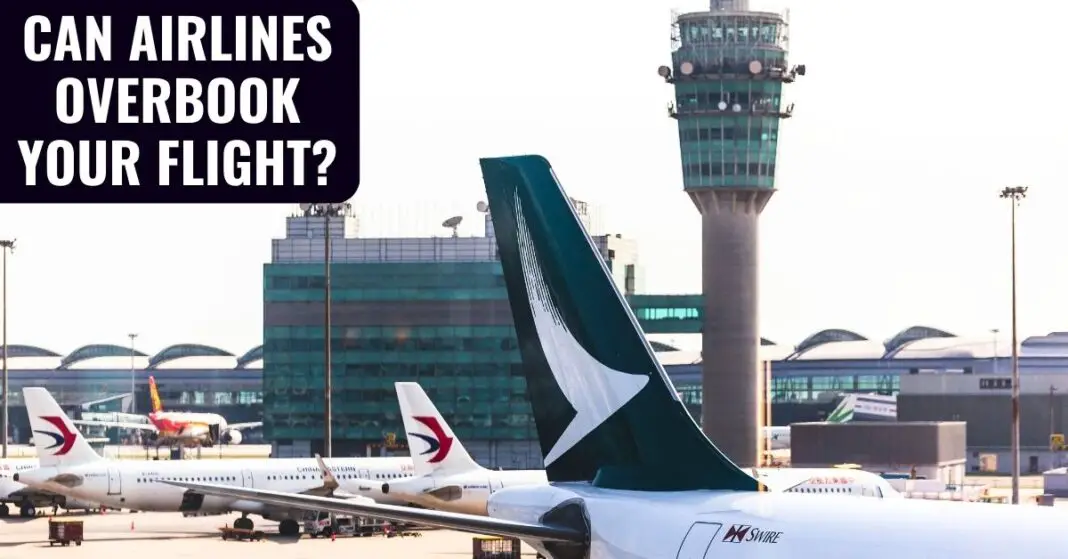Imagine landing at the airport, prepared to embark on an essential trip or much-deserved vacation, only to discover that due to overbooking, your seat on the flight has evaporated into thin air. An intimidating prospect for many, overbooking is a widespread and longstanding practice within the airline industry.
This practice paints a perplexing picture: airlines are selling more tickets than available seats on their flights. This blog embarks on a quest to dissect and understand the complexities of airline overbooking, starting with the influential economic benefits that inspire airlines to indulge in this practice.
Table of Contents
Do Airlines overbook tickets?
Airlines have a tricky balancing act to do – they want to make a lot of money but also avoid chaos. They sometimes sell more tickets than there are seats on the plane, a thing called overbooking. This helps them fill up the flights and not lose money from empty seats. They count on the fact that some people won’t show up, maybe because of canceling or missing connections.
But, things can get messy if more people show up than expected. This leads to “bumping,” where some passengers get kicked off the flight without wanting to, and the airline has to quickly find them a seat on another flight. This can be a big hassle for passengers and make the airline look bad.
Thankfully, many countries have rules about this. If you get bumped, you have the right to compensation and help find another flight. Even though airlines still overbook, knowing about this practice and your rights as a passenger can help deal with any issues you might face during air travel.
As per IATA:
Airlines should be allowed to keep doing overbooking, a practice they’ve been doing for a long time. Airline business is different because once a flight starts, the seats can’t be sold anymore – it’s like a product that can’t last forever. Also, some people with flexible tickets might not cancel before the flight, becoming a “no-show.” Others might cancel too late for the airline to sell their seats again.
Airlines use smart systems to figure out how often people don’t show up for flights on certain routes. This helps them predict how many seats they can sell even if they overbook a bit, making sure they use all the space available for passengers. It’s a way for airlines to make the most of the seats they have for customers.
The Economic Logic Behind Overbooking
To understand, you first need to appreciate some industry facts. Airlines operate with high fixed costs. Whether they fly fully loaded or carry just one passenger, costs like fuel, pilot salaries, aircraft maintenance, and airport charges persist.
Thus, revenue lost from an unoccupied seat is unrecoverable—it bites into profits directly. Therefore, airlines are compelled to maximize their “load factor,” the percentage of seats filled versus total seats available.
And here’s the deal with flight tickets—they tend to have significant levels of cancellation and no-shows. That’s right! Not everyone who buys a ticket shows up for the flight.
Typically, an airline cannot resell a ticket once the gate closes. So, wouldn’t it be financially wise to find a workaround? That’s what overbooking does—it serves as a hedge against these customer behaviors.
Now, you might ask, “Isn’t overbooking a gamble? What if every passenger shows up?” The answer lies in the science of predictive analytics—an arena where airlines have been cruising at an altitude above most industries! Airlines use sophisticated algorithms and historical data to estimate the likely no-show rate for each flight. These predictions help them overbook with near precision.
Yet, there’s always a slim chance of miscalculation, leading to what’s known as “bumping”. It’s an inconvenience rarely appreciated by customers.
However, enforcing a policy with compensations to bumped passengers caters to customer satisfaction and legal compliance. View this as a creative solution to minimize passenger trouble and preserve brand image, while still gaining from overbooking.
Furthermore, bumped passengers also mean on-time departures—a metric crucial for maintaining airport slots, crew schedules, and overall operational efficiencies. So, yes, overbooking is indeed a gamble, but a calculated one with strategies to limit its fallout.
Therefore, overbooking isn’t a capricious or exploitative airline strategy. Instead, it’s a well-calibrated, data-driven approach born out of strategic and financial reasons to maximize profitability, maintain operational efficiencies, and provide better customer service.
To keep soaring in the skies of their competitive industry, airlines continue to evolve their capacity management strategies, of which overbooking is a significant part.
So, the next time you learn that your flight is overbooked, try on the business strategist’s hat for a moment. You’ll unveil a fascinating amalgamation of financial strategy and data science, camouflaged as an ordinary part of your flying experience. And who knows, you might just end up appreciating the process behind that overbooked flight a tad bit more!
Customer Sentiments & Impact
Moving further into the subjects of overbooking, customer experience, and airline reputations, it becomes essential to dig deeper into the ripple effects of these practices and how they interact with each other. However, one cannot fully appreciate these effects without understanding how these factors affect each other both positively and negatively.
Overbooking, as a business tactic, isn’t just a roll of the dice by airlines. It is a strategy that involves balancing monetary gains and potential negative consequences. Key components of this strategy are customer experience and airline reputation, both of which can drastically influence the profitability and success of an airline.
While overbooking can maximize profits, it does take a toll on customer experience. A bumped passenger, regardless of compensation, could associate the airline with negative experiences such as uncertainty, inconvenience, and frustration. This could result in a lowered likelihood of choosing the same airline in the future, thereby affecting the airline’s customer retention rates.
There’s also a risk of negative word-of-mouth, with dissatisfaction becoming contagious as it spreads across social networks and review sites, potentially deterring potential customers.
Furthermore, this sequence – an unhappy customer, negative word-of-mouth, and their ripple effects – can infect the airline’s reputation. Reputation, in the world of business, is priceless and can greatly influence an airline’s competitive edge.
Tourist agencies, business travelers, and casual voyagers, who might previously have preferred the offending airline, might now search elsewhere, leading to potentially significant revenue loss. It could take years, even decades, to repair a tarnished reputation, making overbooking a double-edged sword that airlines must wield with caution and precision.
Regulations & Policies Surrounding Overbooking
Even though overbooking is generally viewed as a beneficial strategy for airlines—an industry laden with high costs—it isn’t without a few rules and regulations. Airlines must take care to steer clear of violating these measures, as they are established to keep the practice fair and beneficial to all parties involved.
To start, according to the U.S. Department of Transportation (DOT), any airline that overbooks flights is mandated to query for volunteers willing to take a later flight before they begin forcefully bumping passengers. This voluntary bumping often comes with perks, which could range from travel vouchers to cash compensations.
Then there’s the Federal Aviation Administration’s (FAA) regulation that mandates airlines to treat passengers who are involuntarily bumped in a just manner. This includes providing a written statement that encompasses the policies concerning overbooking and the criteria for determining which passengers to bump, alongside the compensations that accrue to them.
Compensations to bumped passengers are clearly outlined. The DOT states that if the airline can get the passenger to their destination within one hour of their original arrival time, no compensation is required.
However, if the delay is between one and two hours on domestic flights, or between one to four hours on international flights, passengers are due compensation of 200% of the one-way fare, with a $675 limit. Lengthier delays warrant compensation of 400% of the one-way fare, with a ceiling of $1,350.
Notably, there are limitations to these rules as they do not apply to smaller aircraft carrying less than 30 passengers, and charter or international flights inbound to the United States. Furthermore, airlines are not obliged to compensate if the bumping was a result of substituting a smaller aircraft for safety or operational reasons.
Understanding these regulations is crucial. It’s not just about adherence; it’s also about leveraging these rules to maximize customer satisfaction while maintaining operational efficiency.
For instance, in cases of involuntary bumping, prompt, humane, and consistent treatment of passengers can transform a potentially maddening situation into an opportunity to demonstrate genuine concern and excellent customer service.
With the trend in the airline industry constantly undergoing evolution, it is pivotal to not only adapt to these changes but to be at the forefront of fostering them.
As airlines seek to strike a balance between financial gain and the negative effects of overbooking, they must remain innovative—utilizing strategies such as inter-airline collaborations, offering alternative services, and advanced predictive analytics.
Why is it OK for airlines to overbook flights?
Airlines overbook flights to account for expected no-shows and cancellations, aiming to maximize revenue and efficiently fill available seats. This strategy is driven by the perishable nature of airline seats and the unpredictability of passenger behavior, particularly with flexible ticket holders.
Sophisticated systems analyze historical data to predict no-show percentages, allowing airlines to make informed decisions on how much to overbook.
While overbooking is a common industry practice, regulations exist to protect passengers, ensuring compensation and assistance if more passengers show up than available seats. This practice contributes to the financial health of the airline industry, allowing for competitive pricing and operational viability.
Is it possible for a flight to be overbooked?
Airlines engage in overbooking, a practice where they sell more tickets than available seats on a plane, to maximize profit by filling empty seats from anticipated no-shows and cancellations.
While this strategy benefits airlines by increasing revenue and operational efficiency, passengers may encounter the inconvenience and frustration of involuntary bumps if more people show up than there are seats available.
How do you tell if a flight is overbooked?
Finding out if a flight is overbooked can be tricky, but there are signs to look out for. Keep an eye on really high prices, almost all the seats being taken on the map, and what people say about the airline overbooking. After you book, check the seat map, and be careful if sudden changes or last-minute deals are asking for volunteers.
While you can’t be sure, knowing these signs and what you’re entitled to as a passenger can help you deal with the complications of overbooking.
Do airlines refund overbooked flights?
When flights are overbooked, getting an automatic refund isn’t the norm for airlines, but the situation isn’t straightforward. If you’re involuntarily bumped, you’re entitled to compensation and a new booking, not a refund. Choosing to give up your seat voluntarily can give you perks like vouchers, but you won’t get a refund unless the voucher’s value is less than your original ticket.
Only when flights are entirely canceled due to overbooking do you get a full refund, no matter what type of ticket you have. Understanding your rights and the airline’s rules gives you the tools to navigate overbooked scenarios and make the most of your benefits.
Who gets bumped on overbooked flight?
When a flight is overbooked, passengers who might get bumped are usually those without assigned seats, travelers with flexible tickets, or those who check in last. However, the criteria can vary, and airlines typically consider factors such as check-in time, fare class, frequent flyer status, and whether passengers are part of a group. The





